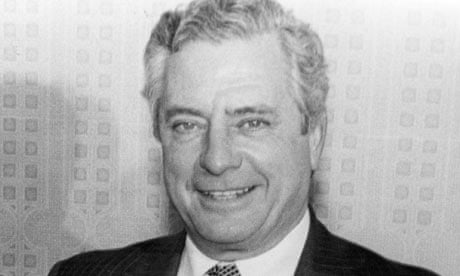Ronald Gregory, who has died aged 88, presided over the disastrous hunt for the Yorkshire Ripper as chief constable of West Yorkshire, compounding muddled work by his detectives with errors of his own. The dismal saga, ended eventually only by the vigilance of two officers from neighbouring South Yorkshire, blighted a career which earlier promised a reputation for modernising and reform.
Gregory's family had been police officers in Lancashire for three generations, and a devotion to loyalty hampered his dealings with senior subordinates in day-to-day charge of the Ripper hunt. He also stood by them when their failings were exposed following Peter Sutcliffe's conviction, challenging both public criticism and a scathing private report commissioned by the Home Office.
Gregory's own contribution to the blind alleys which confused and misled the inquiry, allowing Sutcliffe to remain free to add to his victims, was to put his clout as chief constable behind the hoax "I'm Jack" tapes in June 1979. He fronted a press conference which revealed the taunting messages, and diverted detectives into two years of prioritising a non-existent murderer from Wearside. The "I'm Jack" press and poster campaign added almost £1m to the cost of the inquiry.
It emerged after Sutcliffe's arrest that linguistic advisers had been wary of a possible hoax but were told not to break ranks. They were fully vindicated only in 2006, when John Humble, an alcoholic former labourer and window-cleaner from Sunderland, admitted the hoax and was jailed for eight years. Sutcliffe was a Bradfordian with a Yorkshire accent.
Gregory did not long outlast the inquiry's conclusion. He stayed in post only two years after Sutcliffe's conviction in May 1981, saying that he wanted to remain while the aftermath to the inquiry was "cleared up". In his final annual report in 1983, he wrote: "The Ripper is a thorn in my career. I wish we could have caught him earlier. But I know the men on the case could not have worked any harder."
Gregory was born and brought up in Preston, where he was educated at Harris College, now the University of Central Lancashire. Largely vocational and technical, the college attracted many students on placement from nearby Leyland Motors, including the carmaker's future head, Lord (Donald) Stokes.
Gregory opted instead to follow the family tradition and joined Preston police force in 1941. He just had time to do his probationary service before leaving for the RAF and training as a pilot in the voluntary reserve. After two years, he transferred to the Royal Naval volunteer reserve and served until 1946, when he was demobbed and returned to the beat.
Promotion followed steadily and Gregory became deputy chief constable of Blackpool in 1962, moving to Plymouth as chief three years later. The abolition of individual city forces saw him move to the deputy's job in Devon and Cornwall police in 1968 and to the top job in West Yorkshire a year later.
Gregory showed his management skills as the force was enlarged after the major restructuring of local government in 1973. He was skilful at the delicate task of merging the highly individual constabularies of Leeds and Bradford into a wider county force.
He also obtained generous funding at a time of government cutbacks, and was one of the first chief constables to train large numbers of officers with firearms, anticipating the rise in gun violence of the 1970s. But then, in 1975, Sutcliffe killed the first of his 13 known victims and the long misery of the frustrated hunt began.
After retirement, in which he might have indulged his interests in golf, sailing and skiing, Gregory made another mistake, albeit one which earned him a reported £40,000. He sold his side of the story to the Mail on Sunday, causing a storm of criticism. Relatives of some of the Ripper's victims accused him of taking "blood money", the then home secretary Leon Brittan called him "deplorable" and – particularly hurtful to Gregory – the Police Review branded him disloyal and a hypocrite.
The serialisation also prompted the West Yorkshire police authority to publish an internal report on the Ripper inquiry by Colin Sampson, later Sir Colin, which had been kept secret on Gregory's advice. It made further damaging criticisms, and also showed how Gregory's efforts to build up and equip West Yorkshire police had still left the force under-equipped and overstretched. Sutcliffe aside, officers had to deal with 152 other murders during the five-year inquiry.
Gregory was awarded the Queen's Police medal in 1971 and appointed CBE in 1980. The present chief constable of West Yorkshire, Sir Norman Bettison, described him as "a man respected for his professional commitment and resilience". He is survived by his wife, Grace, and two sons.
